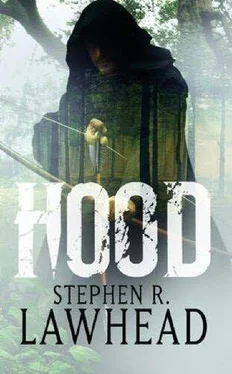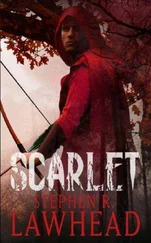Stephen Lawhead - Hood
Здесь есть возможность читать онлайн «Stephen Lawhead - Hood» весь текст электронной книги совершенно бесплатно (целиком полную версию без сокращений). В некоторых случаях можно слушать аудио, скачать через торрент в формате fb2 и присутствует краткое содержание. Жанр: Фэнтези, на английском языке. Описание произведения, (предисловие) а так же отзывы посетителей доступны на портале библиотеки ЛибКат.
- Название:Hood
- Автор:
- Жанр:
- Год:неизвестен
- ISBN:нет данных
- Рейтинг книги:4 / 5. Голосов: 1
-
Избранное:Добавить в избранное
- Отзывы:
-
Ваша оценка:
- 80
- 1
- 2
- 3
- 4
- 5
Hood: краткое содержание, описание и аннотация
Предлагаем к чтению аннотацию, описание, краткое содержание или предисловие (зависит от того, что написал сам автор книги «Hood»). Если вы не нашли необходимую информацию о книге — напишите в комментариях, мы постараемся отыскать её.
Hood — читать онлайн бесплатно полную книгу (весь текст) целиком
Ниже представлен текст книги, разбитый по страницам. Система сохранения места последней прочитанной страницы, позволяет с удобством читать онлайн бесплатно книгу «Hood», без необходимости каждый раз заново искать на чём Вы остановились. Поставьте закладку, и сможете в любой момент перейти на страницу, на которой закончили чтение.
Интервал:
Закладка:
After visiting a few of the dwellings, they returned to their horses. "A piss-poor place," observed Earl Philip, climbing back into the saddle. "I would not allow one of my dogs to live here." He shook his head. "Are they all like this?"
"More or less," replied Falkes. "They are mostly herdsmen, from what I can tell. They follow their cattle, and these holdings are often abandoned for months at a time,"
"What about the farms, the crops?" wondered Philip, taking up the reins.
"There are few enough of those," answered Falkes, turning his horse back onto the trackway. "Most of the open land is used for grazing."
"That will change," decided Philip. "This soil is rich-look at the grass, lush and thick as it is! You could grow an abundance of grain here-enough to feed an army."
"Which is precisely what will be needed," replied Falkes, urging his mount forward. He thought about the baron's plans to subdue the next commots. "Two or three armies."
They rode to the top of the hill above the settlement and looked out over the empty valley with its narrow stream snaking through the deep green grass, rippling in the wind. In his mind's eye, Earl Philip could see farms and villages springing up throughout the territory. There would be mills-for wood and wool and grain-and storehouses, barns, and granaries. There would be dwellings for the farmers, the workers, the craftsmen: tanners, chandlers, wainwrights, ironsmiths, weavers, bakers, dyers, carpenters, butchers, fullers, leatherers, and all the rest.
There would be churches, too, one for each village and town, and perhaps a monastery or two as well. Maybe, in time, an abbey.
"A good place," mused Falkes.
"Yes." His cousin smiled and nodded. "And it is a good thing we have come." He let his gaze sweep over the hilltops and up to the blue vault of heaven and felt the warm sun on his face. "Elfael is a rough gem, but with work it will polish well."
"To be sure," agreed Falkes. "God willing."
"Oh, God has already willed it," Philip assured him. "As sure as William is king, there is no doubt about that." He paused, then added, "None whatsoever."
CHAPTER
17
The day following the feast of Saint Edmund-three weeks after Earl Philip's visit and the weather had turned raw. The wind was rising out of the north, gusting sharply, pushing low, dirty clouds over the hills. Count Falkes's thin frame was aching with the chill, and he longed to turn around and ride back to the scorching, great fire he kept blazing in the hearth, but the baron's men were still disputing over the map they were making, and he did not want to appear irresolute or less than fully supportive of his uncle's grand enterprise.
There were four of them-an architect, a surveyor, and two apprentices-and although Falkes could not be sure, he suspected that in addition to their charting activities, they were also spies. The questions they asked and the interest they took in his affairs put the count on his guard; he knew only too well that he enjoyed his present position through the sufferance of Baron de Braose. Not a day went by that he did not ponder how to further advance his uncle's good opinion of him and his abilities, for as Elfael had been given, so Elfael could be taken away. Without it, he would become again what he had been: one more impoverished nobleman desperate to win the favour of his betters.
Fate had reached down and plucked him from the heaving ranks of desperate nobility. Against every expectation, he had been singled out for advancement and granted this chance to make good. Spoil this, and Falkes knew another opportunity would never come his way. For him, it was Elfael… or nothing.
Thus, he must ever and always remain vigilant and ruthless in his dealings with the Welsh under his rule, nor could he afford to show any weakness to his countrymen, however insignificant, that might give the baron cause to send him back to Normandie in disgrace.
Although his cousin Philip heartily assured him that his uncle, the baron, applauded his accomplishments, Falkes reckoned he would not be secure in his position as Lord of Elfael until the de Braose banner flew unopposed over the surrounding commots. So despite the bonecracking cold, a most miserable Falkes remained with his visitors, sitting on his horse and shivering in the damp wind.
The surveying party had arrived the day before when the first wains rolled down into the shallow bowl of the valley. Bumping across the stream that was now a swift-running torrent, the high-sided, woodenwheeled vehicles toiled up the slope and came to a stop at the foot of the mound on which the fortress stood. The wagons, five in all, were full of tools and supplies for the men who would oversee the construction of the three castles Baron de Braose had commissioned. Building work would not begin until the spring, but the baron was anxious to waste not a single day; he wanted everything to be ready when the masons and their teams of apprentices arrived with the thaw.
By the time the wildflowers brushed the hilltops with gold, the foundations of each defensive tower would be established. When the stars of the equinox shone over the sites, the ditches would be man deep and the walls shoulder high. By midsummer, the central mound would belly to the sky, and stone curtains twice the height of the workmen would crown the hillcrests. And when the time came for the master mason to call his men to pack their tools and load the wains to return to their families in Wintancaester, Oxenforde, and Gleawancaester, the walls and keep, bailey, donjon, and ditch would be half-finished.
For now, however, the wagons and animals would remain in sight of Caer Cadarn, where their drivers would camp in the lee of the fortress to shelter from the perpetual wind and icy rain that roared down out of the northwest. All winter long, Count Falkes's men-atarms would be kept busy hunting for the table, while the footmen and servants foraged for wood to keep the fires ablaze in hearth and fire ring of caer and camp.
It was not at all a convivial country, Falkes decided, for although winter had yet to arrive in force, the count had never been so cold in all his life. Curse the baron's impatience! If only the invasion of Elfael could have waited until the spring. As it was, Falkes and his men had come so late to Wales that they had not had time to adequately prepare for the season of snow and ice. Falkes found he had seriously underestimated the severity of the British weather; his clothes-he wore two or three tunics and mantles at a time, along with his heaviest cloak-were too thin and made of the wrong stuff. His fingers and toes suffered perpetual chilblains. He stamped his way around the fortress, clapping his hands and flapping his arms across his chest to keep warm. By night, he took to his bed after supper and burrowed deep under the fleeces and skins and cloaks that served him for bedclothes in his dank, wind-fretted chamber.
Just this morning he had awakened in his bed, aghast to find that frost had formed on the bedclothes overnight; he swore an oath that he would not sleep another night in that room. If it meant he had to bed down with the servants and dogs beside the hearth in the great hall, so be it. The only time his hands and feet were ever warm was when he sat in his chair before the hearth, with arms and legs outstretched toward the fire-a position he could maintain only for a few moments altogether; but those were moments of pure bliss in what looked to be a long, grinding, bitter winter-more ordeal than season.
It was not until the light was beginning to fail and the surveyor could no longer read the chart he was making that the builders decided to stop for the day and return to Caer Cadarn. The count was the first to turn his horse and head for home. As the work party came in sight of the fortress, the skies opened and rain began hammering down in driving sheets. Falkes lashed his mount to speed and covered the remaining distance at a gallop. He raced up the long ramp, through the gates, and into the yard to find a half dozen unfamiliar horses tethered to the rail outside the stable.
Читать дальшеИнтервал:
Закладка:
Похожие книги на «Hood»
Представляем Вашему вниманию похожие книги на «Hood» списком для выбора. Мы отобрали схожую по названию и смыслу литературу в надежде предоставить читателям больше вариантов отыскать новые, интересные, ещё непрочитанные произведения.
Обсуждение, отзывы о книге «Hood» и просто собственные мнения читателей. Оставьте ваши комментарии, напишите, что Вы думаете о произведении, его смысле или главных героях. Укажите что конкретно понравилось, а что нет, и почему Вы так считаете.







